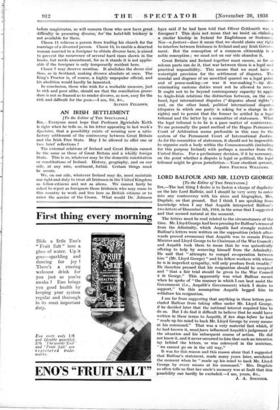AN IRISH SETTLEMENT [To the Editor of THE SPECTATOR.] Sin,—Everyone
must hope that Professor_Boriedale Keith is right when he tells us, in his letter appearing in last week's Spectator, that a possibility exists of securing now a satis- factory settlement of the controversy between Great Britain and the Irish Free State. May I be allowed to offir one or two brief' reflections ?
The external relations of Ireland and Great Britain cannot be the same as those of Great Britain and a iyhoilly foreign State. This is so, whatever may be the domeitic constitution or constitutions of Ireland. History, geography, and on our side, at any rate, sentiment, forbid. Certain things must be secure.
We, on our side, whatever Ireland may do, must maintain our right and duty to treat all Irishmen in the UnitedKingdom as fellow-citizens and not as aliens. We- cannot fairly be asked to reject as foreigners those IrishMen whosmay come to this country to work and live here as British citizens or to enter the service of the Crown. What would Dr... Johnson have said if he had been told that Oliver Goldsmith was a foreigner ? This _does not mean that we insist on :-claiming a similar kinship in Ireland for Englishmen or Scotsmen. Nor—a fortiori—does it mean that we should claim any right to interfere between Irishmen in Ireland andsny Irish Govern- ment. But the conception of a common -citizenship is a noble conception ; we must not on our side abandon it. Great Britain and Ireland together must ensure, so far as solemn pacts can do it, that war between them is a*legal and practical impossibility. • This means that we must have a watertight provision for the settlement of disputes. The scandal and disgrace of an unsettled quarrel on a, legal point and of peace-making-7or was it war-making ?—by . dis- criminating customs duties must not be allowed to recur. It ought not to be beyond contemporary capacity to apply to Anglo-Irish relations the distinction between, on the one hand, legal international disputes (" disputes about rights") and, on the other hand,' political international. disputes (disputes in which one party is asking for a change in its rights) and to persist that the former be settled by _a legal tribunal and the latter by a committee of statesmen. What the legal tribunal is to be is a pure matter of controversy. To me personally the panel method of the Hague Permanent Court of Arbitration seems preferable in this case to the system of the Permanent Court of International Justice. As for the committee of statesmen, it should not be impossible to organise, such a body within the Commonwealth (including; for this purpose Ireland) with perhaps a member from the United States. For a preliminary decision, if it be neeessary, on the point whether a dispute is legal or political, the legal tribunal might be given jurisdiction.—Your obedient servant,
JOHN FISCHER WILLIAMS.




























































 Previous page
Previous page